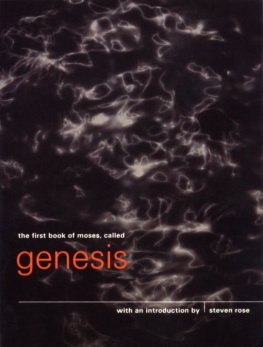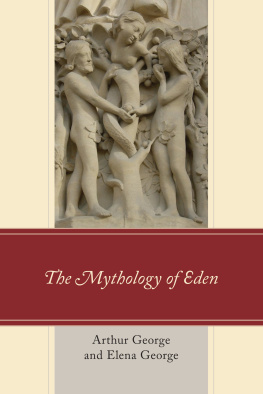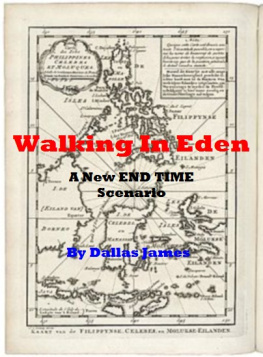
Karl Ove Knausgaard
A Time for Everything
Translated from the Norwegian by James Anderson
archipelago books
Copyright Karl O. Knausgaard, 2004
English translation copyright James Anderson, 2008
First Archipelago Books edition 2009
All rights reserved. No part of these books may be reproduced or transmitted
in any form without the prior written permission of the publisher.
First published as En Tid For Alt in Norway by Forgalet Oktober in 2004.
Library of Congress Cataloging-in-Publication-Data
Knausgrd, Karl Ove, 1968-
[Tid for alt. English]
A time for everything / Karl O. Knausgaard ;
translated from the Norwegian by James Anderson.
p. cm.
I. Anderson, James. II. Title.
PT8951.21.N38T5313 2009
839.82'38 dc22
2009013489
Archipelago Books
232 Third St. #A111
Brooklyn, NY 11215
www.archipelagobooks.org
Distributed by Consortium Book Sales and Distribution
www.cbsd.com
Cover art by Giotto, detail from Lamentation, 1305
This publication was made possible with financial support from Lannan Foundation,
National Endowment for the Arts, the New York State Council on the Arts, a state agency,
and NORLA (Norwegian Literature Abroad).

A Time for Everything
Contents
A NTINOUS had been born in 1551 at Ardo, a small mountain town in the far north of Italy, where in all likelihood he remained until he began to study in 1565. Apart from one particular event, to which he was to return time after time for the rest of his life, little is known about his early years. The names of his parents and native town do not figure anywhere in Antinouss writings, and, as they are otherwise characterized by a large amount of biographical detail, this early obscurity has aroused the curiosity of many readers. But if one is to attempt to understand Antinous, it isnt to the inner man one must turn. For even if one succeeded in charting his inner landscape as it actually was, right down to the smallest fissure and groove in the massif of his character, imperceptibly shaped by the slow erosion of events, and traced the course of the flood of feelings back to their source, one would end up no wiser and the meaning of what was being charted would remain obscure. Even if the events and relationships of his life were to correspond exactly with a life in our own time, one that we could understand and recognize, we would still come no closer to him. Antinous was, first and foremost, of his time, and to understand who he was, that is what must be mapped. The minimal emphasis we place on this difference is due perhaps in particular to the lasting influence of Freud, that speculative genius of the twentieth century, whose fatal confusing of culture with nature, combined with his equally fatal insistence on the external events inner consequences, has influenced our self-understanding more than anything else, and lured us so far away from our ancestors that we believe they were like us. But our world is only one of many possible worlds, something of which the writings of Antinous and his contemporaries serve to remind us in no small measure.

The decisive event in Antinouss life occurred when he was eleven years old. Where hed come from, were not told, nor where he went afterward, and the fact that the incident is surrounded by obscurity makes each detail in his narrative stand out with unprecedented clarity. The red tinge of the earth he walks on, the green leaves of the riverside trees hes approaching, the yellow sun, the blue sky, the shimmering dragonfly that hovers for an instant in the air in front of him, before it breaks free and next moment is flying away to the trees. The fishing rod hes carrying over his shoulder, his dusty feet, his brow glistening with sweat. The way the shadows from the trees are splintered by sunbeams into small, quivering lattices of light as the wind takes hold of the boughs and gently rocks them up and down. The moss on the stones by the rivers edge, the distortions of the current on the black surface, trouser legs that darken with water when he steps into the water, eyes that close in rapture.
All that long Sunday hes been looking forward to this. Coming here, to this shady pool in the river, his regular spot, to fish.
After a while he gets up, pulls out a worm hes been carrying in his pocket, and threads it on the hook. Even with half its body impaled, it tries to wriggle free. Its pale pink color and the small grooves on its skin make it look a bit like a finger, he thinks, as he studies it for a moment before clasping the writhing end and impaling that on the hook as well. Then he casts it out onto the water.
When, half an hour later, he hasnt had a single bite, he walks a few hundred yards upriver to the next fishing place. But there are no bites here, either. Feeling restless, he decides to hide his rod and go exploring up the valley instead. He stands a while above the rapids and stares down into the sparkling water, fascinated by how all its various movements always occur in one place, from the swelling current at the top, where the water looks as if its flowing inside a membrane, to the roaring fall below the ledges, which almost seems to be plowed into the waiting mass of water below, there to create innumerable small eddies on the surface.
The eddies are made up of water, he thinks. So why dont they flow away when the water flows away?
He chucks a stick into the river above the rapids and follows it, running down faster and faster, until it goes over the edge and disappears into the foam. When, a little while later, it comes gliding into the backwater, hes there ready to pick it up. He repeats this game a couple of times before he tires of it and continues his journey. He follows a path up the rough mountainside and halts, damp with sweat, at the summit to look out across the plain. The town he comes from, lying in shadow under the mountains on the other side, is hard to see with the bright light in his eyes. The thought that a stranger probably wouldnt have spotted it fills him with pride, for he knows, he sees. For a while he amuses himself pointing out various houses and places to the stranger, whos just as amazed each time. Is that a house, you say? Who would have thought it? It looks just like part of the mountain! Then he turns and gazes down at the forest in the valley on the other side. Dark green and dense it lies, ringed by mountains, as if in a crater. There are tales told about this forest, but now, highlighted here and there by clearings, meadows, and small, glittering lakes, it doesnt seem the least threatening, and without giving it a second thought he carries on down the path.
When he gets into the valley, hes struck by how silent it is. The air is quite stagnant between the trees, as if exhausted by the heat. The shade beneath the treetops is scaled by shafts of light, filled in places by small pockets of swarming insects. There is the scent of resin, dry pine needles, warm earth. The water in the stream hes following is greenish black in the gloom beneath the great conifers, blue and sparkling where the sky opens up above it, shiny white and frothing in the terrace-like falls leading to the little lake in the middle of the valley. Full of adventure, he runs this way and that and, completely impervious to the approach of evening, moves ever deeper into the valley. He sees a wasps nest under a branch, he sees a meadow filled with butterflies, he sees a dead cow in a ditch, and the disgusting stink that emerges when he finally manages to push a stick into its rotting belly almost makes him sick. He sees a dried snakeskin in some scree, he sees a cherry tree in full bloom, he sees a hare bound past him in the grass only a few yards away, and as the sun goes down, hes lying on his stomach in front of a huge anthill studying the strange life going on there. He doesnt notice that the suns rays are moving higher and higher up the mountainsides and that the valley around him is gradually filling with darkness. Nor does he register that the birds have stopped singing, or that the constant hum of insects gradually decreases. He is watching the workers marching in long lines with their small loads of organic material on their backs, pine needles, pieces of leaf, blades of grass, or bits of dead insect they have come across on their journey, and the posted sentries that constantly go up to the lines of ants and sniff them, like dogs, and occasionally raise themselves up and gesticulate with their forelegs, at which the alien ant, having perhaps believed that its identity was a well-kept secret in the throng, rushes off and disappears into the undergrowth.
Next page














